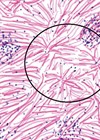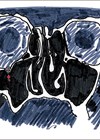This is a retrospective case series review of 28 biopsy-proven IgG4-related ophthalmic disease (ROD) patients treated between March 2010 – January 2017 from Seoul, Korea. The mean follow-up period was 27.3 months. Lacrimal glands were involved in all patients and 22 had bilateral involvement. Eighty-two percent responded to systemic steroids (either oral 0.6mg/kg/day for initial four weeks, then tapered by 5mg every two to four weeks with adjustment according to clinical response, or intravenous methylprednisolone 500mg weekly for initial six weeks, then 250mg weekly for six weeks), 43% relapsed and required additional therapies of either azathioprine or methotrexate. Elevated serum IgG4 levels were in 32% and systemic disease in 64%. Recurrence was associated with elevated serum IgG4 levels prior to steroid treatment (p=0.007), lower dose (p=0.05), and shorter duration of initial steroid treatment (p=0.042). Those who relapsed required significantly higher dose of steroids than those without recurrence (p=0.011). The authors recommended low dose maintenance steroid treatment should be considered to avoid recurrence in patients with elevated serum IgG4 levels.





